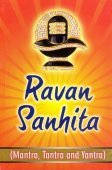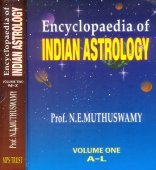Ran, Rañ, Raṇ: 10 definitions
Introduction:
Ran means something in Hinduism, Sanskrit, Hindi. If you want to know the exact meaning, history, etymology or English translation of this term then check out the descriptions on this page. Add your comment or reference to a book if you want to contribute to this summary article.
Images (photo gallery)
In Hinduism
Vyakarana (Sanskrit grammar)
Source: Wikisource: A dictionary of Sanskrit grammarRañ (रञ्).—tad. affix र (ra) causing vrddhi, applied to the word अग्नीध् (agnīdh) in the sense of Sarana i.e. a room or a place; e.g. आग्नीघ्रम् (āgnīghram) cf. अग्नीध (agnīdha); शरणे रञ् भं च (śaraṇe rañ bhaṃ ca) P. IV.3.120 Vart, 9.
--- OR ---
Raṇ (रण्).—Same as रञ् (rañ) being only a variant, See रञ् (rañ).
--- OR ---
Ran (रन्).—Personal ending रन् (ran) substituted for the personal ending झ (jha) of the प्रथमपुरुष (prathamapuruṣa) (third person) Atmanepada of 'lin' (potential and benedictive); cf. झस्य रन् (jhasya ran) P.III. 4.105.

Vyakarana (व्याकरण, vyākaraṇa) refers to Sanskrit grammar and represents one of the six additional sciences (vedanga) to be studied along with the Vedas. Vyakarana concerns itself with the rules of Sanskrit grammar and linguistic analysis in order to establish the correct context of words and sentences.
Languages of India and abroad
Sanskrit dictionary
Source: DDSA: The practical Sanskrit-English dictionaryRaṇ (रण्).—1 P. (raṇati, raṇita)
1) To sound, ring, tinkle, jingle (as anklets &c.); रणद्भिराघट्टनया नभस्वतः पृथग्विभिन्न- श्रुतिमण्डलैः स्वरैः (raṇadbhirāghaṭṭanayā nabhasvataḥ pṛthagvibhinna- śrutimaṇḍalaiḥ svaraiḥ) Śiśupālavadha 1.1; चरणरणितमणिनूपुरया परिपूरितसुरत- वितानम् (caraṇaraṇitamaṇinūpurayā paripūritasurata- vitānam) Gītagovinda 2.
2) To go.
3) Ved. To rejoice.
Source: Cologne Digital Sanskrit Dictionaries: Shabda-Sagara Sanskrit-English DictionaryRaṇ (रण्).—r. 1st cl. (raṇati) 1. To sound. 2. To go, to move.
Source: Cologne Digital Sanskrit Dictionaries: Benfey Sanskrit-English DictionaryRaṇ (रण्).— (developed out of ram- ṇā, i. e. ram, ii. 9), i. 4, and i. 1, [Parasmaipada.] i. 4, 1. To shout. 2. To rejoice,
— With the prep. ni ni, i. 4, To rejoice,
Ran (रन्).—1. raṇati raṇate & raṇyati be pleased, rejoice, take pleasure in ([locative], [rarely] [accusative]). [Causative] raṇayati, te delight a [person or personal] with ([instrumental]) or in ([locative]), or = [Simple] ([with] [locative]).
--- OR ---
Ran (रन्).—2. raṇati [participle] raṇita (q.v.) ring, sound, tinkle. [Causative] raṇayati make ring etc.
Source: Cologne Digital Sanskrit Dictionaries: Monier-Williams Sanskrit-English Dictionary1) Raṇ (रण्):—1. raṇ or ran (cf. √ram) [class] 1. 4. [Parasmaipada] raṇati, raṇyati (2. [dual number] raṇyathaḥ, [Ṛg-veda i, 112, 18]; [perfect tense] rAraRa, [Ṛg-veda]; [Aorist] arāṇiṣuḥ, raṇiṣṭana, [ib.]),
—to rejoice, be pleased, take pleasure in ([locative case], rarely [accusative]), [Ṛg-veda];
—to gladden, delight, gratify, [ib.] :
—[Causal] raṇḍyati, te, to cheer, gladden, exhilarate with ([instrumental case] or [locative case]), [Ṛg-veda];
—to be at ease, be pleased or satisfied with, delight in ([locative case]), [ib.; Taittirīya-saṃhitā; Atharva-veda] :—[Intensive] ([subjunctive] rāraṇat, rāran; [imperative] rārandhi, rārantu) = [Causal] (as well in the trans. as in the intrans. meanings), [Ṛg-veda]
2) Ran (रन्):—1a or raṇ (cf. √ram) [class] 1. 4. [Parasmaipada] raṇati, raṇyati (2. [dual number] raṇyathaḥ, [Ṛg-veda i, 112, 18]; [perfect tense] rAraRa, [Ṛg-veda]; [Aorist] arāṇiṣuḥ, raṇiṣṭana, [ib.]),
2) —to rejoice, be pleased, take pleasure in ([locative case], rarely [accusative]), [Ṛg-veda];
2) —to gladden, delight, gratify, [ib.] :
2) —[Causal] raṇḍyati, te, to cheer, gladden, exhilarate with ([instrumental case] or [locative case]), [Ṛg-veda];
2) —to be at ease, be pleased or satisfied with, delight in ([locative case]), [ib.; Taittirīya-saṃhitā; Atharva-veda] :—[Intensive] ([subjunctive] rāraṇat, rāran; [imperative] rārandhi, rārantu) = [Causal] (as well in the trans. as in the intrans. meanings), [Ṛg-veda]
3) Raṇ (रण्):—2. raṇ [class] 1. [Parasmaipada] ([Dhātupāṭha xiii, 2]) raṇati ([grammar] also [perfect tense] rarāṇa [future] raṇitā etc.), to sound, ring, rattle, jingle, [Kāvya literature; Purāṇa] :
—[Causal] raṇayati ([Aorist] arīraṇat or ararāṇat, [Patañjali on Pāṇini 7-4, 3]), to make resound, [Bhāgavata-purāṇa] :—[Desiderative] riraṇiṣati [grammar]:—[Intensive] raṃraṇyate, raṃraṇṭi, [ib.]
4) 3. raṇ [class] 10. [Parasmaipada] raṇayati, to go, [Dhātupāṭha xix, 33; 56.]
5) Ran (रन्):—1b See √1. raṇ.
6) 2. ran (meaning doubtful), [Ṛg-veda i, 120, 7] ([according to] to [Sāyaṇa] = rātārau or dātārau, ‘givers’, [from] √ā, the sg. being substituted for the [dual number])
Source: Cologne Digital Sanskrit Dictionaries: Yates Sanskrit-English DictionaryRaṇ (रण्):—raṇati 1. a. To sound; to go.
[Sanskrit to German]
Sanskrit, also spelled संस्कृतम् (saṃskṛtam), is an ancient language of India commonly seen as the grandmother of the Indo-European language family (even English!). Closely allied with Prakrit and Pali, Sanskrit is more exhaustive in both grammar and terms and has the most extensive collection of literature in the world, greatly surpassing its sister-languages Greek and Latin.
Hindi dictionary
Source: DDSA: A practical Hindi-English dictionary1) Ran in Hindi refers in English to:—(nm) war, battle, fighting, combat; ~[karma] fighting; combating; ~[kami] war-mongering; bellicose; ~[kari] fighting, combating belligerent; -[kosha] war-fund; ~[kshetra] the battlefield, theatre of war; ~[camdi] Bellona; the war-goddess; ~[turya/bheri] bugles of war, wartrumpets; -[niti] strategy; -[bamkura] valorous; a great fighter; ~[bhumi] the battlefield; -[ramga] the battlefield, theatre of war; fighting spirit; -[shisha] training in the art of fighting; -[samkula] fierce fighting; -[sajja] war-preparation; battle equipment; armament; ~[simha] see ~[turya]; ~[sthala] the battlefield..—ran (रण) is alternatively transliterated as Raṇa.
2) Ran in Hindi refers in English to:—(nm) a run (in cricket); a reclaimed part of the sea (e.g. [kaccha ka rana])..—ran (रन) is alternatively transliterated as Rana.
3) Ran in Hindi refers in English to:—(nf) thigh; —[mem jora hona] to have virility/masculine vitality..—ran (रान) is alternatively transliterated as Rāna.
...
See also (Relevant definitions)
Starts with (+1262): Raango, Rambha, Ramce, Ramceganu, Ramceya, Ramcige, Ramcike, Ramdabajatana, Ramdana, Ramdanagitti, Ramdaniga, Ramde, Ramdehunnime, Ramdehunnive, Ramdetana, Ramdholu, Ramdhrapatre, Ramdhri, Ramdhrikarana, Ramdhrisu.
Ends with (+1303): A-cakayacuran, Aadikiran, Aagamanaatmak-samanyikaran, Aatmaniyantran, Aay-antiran, Abharan, Abhimantran, Abhimukhikaran, Abhipran, Abhipreran, Abhisaran, Aboloko pinran, Acakaran, Acamparan, Acaraparan, Acariran, Acharan, Aciran, Acittiran, Aciyakkaran.
Full-text (+545): Rana, Ranat, Viranin, Ran-takda, Viran, Bhran, Ranaranayita, Ramsu, Ranarana, Dhavi, Patidhavi, Kikyo-ran, Koto-shi-ran, Nioi-shuro-ran, Ekahalmadhya, Ranaranaka, Niran, Yakushima-hime-ari-doshi-ran, Mithyacarat, Ranatkara.
Relevant text
Search found 162 books and stories containing Ran, Rañ, Raṇ; (plurals include: Rans, Rañs, Raṇs). You can also click to the full overview containing English textual excerpts. Below are direct links for the most relevant articles:
I Ran Along the River < [April – June 1992]
The Bird < [April – June, 1997]
A Recollection < [April – June, 2005]
Chaitanya Bhagavata (by Bhumipati Dāsa)
Verse 2.17.32 < [Chapter 17 - The Lord’s Wandering Throughout Navadvīpa and Descriptions of the Devotees’ Glories]
Verse 2.26.95-096 < [Chapter 26 - Descriptions of the Mercy Bestowed on Śuklāmbara and Vijay and the Lord’s Desire to Accept Sannyāsa]
Verse 1.7.158 < [Chapter 7 - Śrī Viśvarūpa Takes Sannyāsa]
Vinaya Pitaka (3): Khandhaka (by I. B. Horner)
The story of a killer of a perfected one < [1. Going forth (Pabbajjā)]
The story of the excellent group < [1. Going forth (Pabbajjā)]
The story of a thief (wearing) a garland of fingers < [1. Going forth (Pabbajjā)]
The Great Chronicle of Buddhas (by Ven. Mingun Sayadaw)
Discourse on Duddubha or Daddabha Jātaka < [Chapter 22 - Founding of Vesali]
The Alīnacitta Jātaka < [Chapter 43 - Forty-one Arahat-Mahatheras and their Respective Etadagga titles]
Power of Truthfulness during The Buddha’s Time < [Chapter 6 - On Pāramitā]
Folklore of the Santal Parganas
Chapter 5 - The Jackal and the Tigers < [Appendix]
Chapter CXV - The Elephant and the Ants < [Part II]
Chapter 19 - The Prince Who Became King of the Jackals < [Appendix]
Related products








